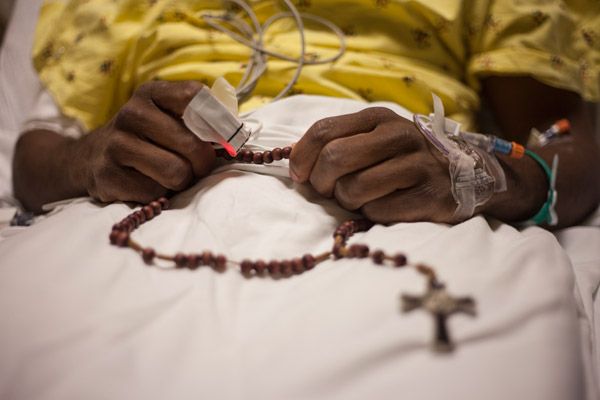
Ministry of Care and Companionship
Ministry of Care and Companionship Resources
-
Canadian Hospice Palliative Care Association provides helpful information to family members, loved ones, friends or neighbors who provide support or care for a dying family member, loved one or friend.
Caregivers Library The National Caregivers Library is one of the most extensive libraries for caregivers that exists today. It contains hundreds of articles, forms, checklists and links to topic-specific external resources organized into easy to find categories.
Care Givers Nova Scotia provides free programs, service, information and advocacy for unpaid, family and friend caregivers. They are dedicated to providing recognition and practical assistance to friends and family giving care.
Caregiver Tele-Connect (CTC) is a new initiative aimed at supporting caregivers who will be giving palliative care to a loved one at home.
The Canadian Virtual Hospice provides support and personalized information about palliative and end-of-life care to patients, family members, health care providers, researchers and educators.
Pallium Canada provides interprofessional education in palliative and end-of-life care. They are invested in helping Canada mobilize around Palliative Care as a public health issue.
Quality End of Life Coalition of Canada is working to improve end-of-life care for all Canadians. Their goals are to improve access to care, increase the number of professionals and volunteers with the skills to provide high quality end-of-life care, promote research that would improve care, support the family members who care for the people who are dying, and educate Canadians about their choices at end of life.
Web MD Web MD provides a Caregivers Guide to Palliative Care with helpful links to information, resources, grief and coping with illness.
-
Canadian Conference of Catholic Bishops provides the Catholic Church’s most recent statements on euthanasia and assisted suicide.
Catholic Health Alliance of Canada the Alliance is a forum for Catholic health and social services sponsors in Canada, to exchange ideas and develop shared strategic initiatives that support their ability to strengthen the healing ministry of Jesus. The Alliance is comprised of 12 Sponsor organizations. Together, these organizations sponsor approximately 100 Catholic hospitals, community health centres, nursing homes and long term care facilities throughout Canada.
Euthanasia Prevention Coalition their goal is to prepare a well-informed, broadly-based network of organizations and individuals supporting measures that will create an effective social barrier to euthanasia and assisted suicide.
Catholic Organization for Life and Family their mission is to build a culture of life and a civilization of love by promoting respect for human life and dignity and the essential role of the family.
-
*Advanced Health Care Directive from Saskatchewan. Visit their website for a copy.
*Advance Care Planning for Health Decisions as a Spiritual Activity Prepared by Sr. Nuala Kenny, OC, BA, MD, FRCP(C), September 2019, Care and Companionship Committee of the Archdiocese of Halifax-Yarmouth
*A Catholic Perspective on Health Decisions and Care at the End of Life prepared by the Catholic Health Alliance of Canada An excellent publication that addresses many of the fundamental questions and concerns about health care in general and specifically end of life care. Included are discussion questions to help people have the necessary conversations.
*Catholic Health Association of Saskatoon Advanced Health Care Directives A plain language explanation of Advanced Health Care Directives, questions and answers, and an Advanced Health Care Directive Document that may be completed for personal use.
*A Catholic Perspective: Triage Principles & Moral Distress in Pandemic Scarcity Prepared by Sr. Nuala Kenny, OC, BA, MD, FRCP(C), July 2020
*Catholic Funerals, Theological and Pastoral Considerations, Archdiocese of Halifax Yarmouth A valuable resource from the Archdiocese of Halifax-Yarmouth clarifying many of the questions that arise when a person is dying. English or French
*Missionary Disciples of Care and CompanionshipPrepared by Sr. Nuala Kenny, OC, BA, MD, FRCP(C), September 2019, Care and Companionship Committee of the Archdiocese of Halifax-Yarmouth
*The Church Speaks Out: Excerpts on Euthanasia, Suicide, and the Christian Meaning of Suffering A collection of Church quotations from various Church documents and papal speeches regarding the topics of euthanasia, suicide, and the Christian meaning of suffering.
*The Way of the Cross Today: Reflections on Suffering in Sickness and Dying Retrieving the insights, solace and strength found in the tradition of the Way of the Cross Sr. Nuala Kenny, SC Archdiocese of Halifax-Yarmouth 2016.
*Pastoral Letter on Physician Assisted Dying (Eng/Fr)
*FAQ on Physican Assisted Dying (English)
*FAQ on Physican Assisted Dying (French)
*Responds to Bill C-14 on Assisted Suicide (eng/fr)
*Catholic Health Association USA Prayer Library A rich collection of prayers for various needs and occasions
The Most Reverend Douglas Crosby, O.M.I., Bishop of Hamilton and President of the Canadian Conference of Catholic Bishops (CCCB), has sent a submission this past October 19 to the Expert Panel on Options for a Legislative Response to Carter v. Canada. The submission includes references to Church teaching with pertinent citations from the Catechism of the Catholic Church, together with excerpts from the CCCB Plenary Assembly's statement on assisted suicide released on September 18, 2015, supplemented with further comments on the urgency and importance of palliative care.
Dear Minister,
Further to the ruling of the Supreme Court of Canada this past February 6, the Catholic Bishops of Canada welcomed the announcement you made in media interviews last month when you said that the federal government will soon reveal details of its public consultations regarding new legislation on assisted suicide. More recently, my brother Bishops and I also noted media reports a few weeks ago which quoted you as saying that the consultation, "while not formally announced, has begun." read more
“Accompany the Dying”: The Church's teaching on Euthanasia and Assisted Suicide
This past February, the Canadian Supreme Court struck down the legal ban on euthanasia in Canada. Legislation is expected within the next year surrounding introducing legal means of doctor-assisted suicide for Canadians. What does this mean for Canadian Catholics? What does the Church say about medical care, suffering, and death, and how can we be witnesses to our faith in light of this radical change to our culture?
On Friday, Feb 6 the Supreme Court of Canada struck down sections of the Criminal Code dealing with assisting in suicide. People everywhere have responded in one way or another to this change. The weekend of the ruling Archbishop Mancini shared his own thoughts and response in the his homily for the 5th Sunday in Ordinary Time:
“Sing praises to the Lord who heals the broken-hearted” – Psalm 147
Dear Friends,
Today the gospel shows us Jesus, the healer! He healed Peter’s mother-in-law, and he healed all those who were brought to him that evening. Why did he do that?
His actions are expressions of compassion and care for all human beings and especially for those who suffer. The responsorial psalm invites us to see and recognize the Lord’s passionate care and to be grateful for his attentiveness. As we gather today to celebrate the Eucharist, let us indeed sing and rejoice to the Lord – because he and only he can fully heal the broken-hearted.
Catholics are called by their faith to assist all those in need, particularly the poor, the suffering and the dying. Comforting the dying and accompanying them in love and solidarity has been considered by the Church since its beginning a principal expression of Christian mercy.
Helping someone commit suicide, however, is neither an act of justice or mercy, nor is it part of palliative care. The decision of the Supreme Court of Canada today does not change Catholic teaching. "[A]n act or omission which, of itself or by intention, causes death in order to eliminate suffering constitutes a murder gravely contrary to the dignity of the human person and to the respect due to the living God, our Creator." (Catechism of the Catholic Church, 2277).

Prayer
Samples of prayers for specific moments, as well as contact info for a great variety of resources.

Services & Outreach
Descriptions and contact information for the services that are available throughout the archdiocese.

Resources
Contact info for information and materials to meet the great many needs, interests and circumstances.
